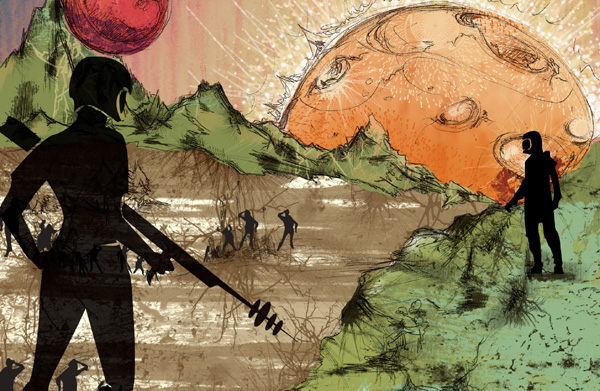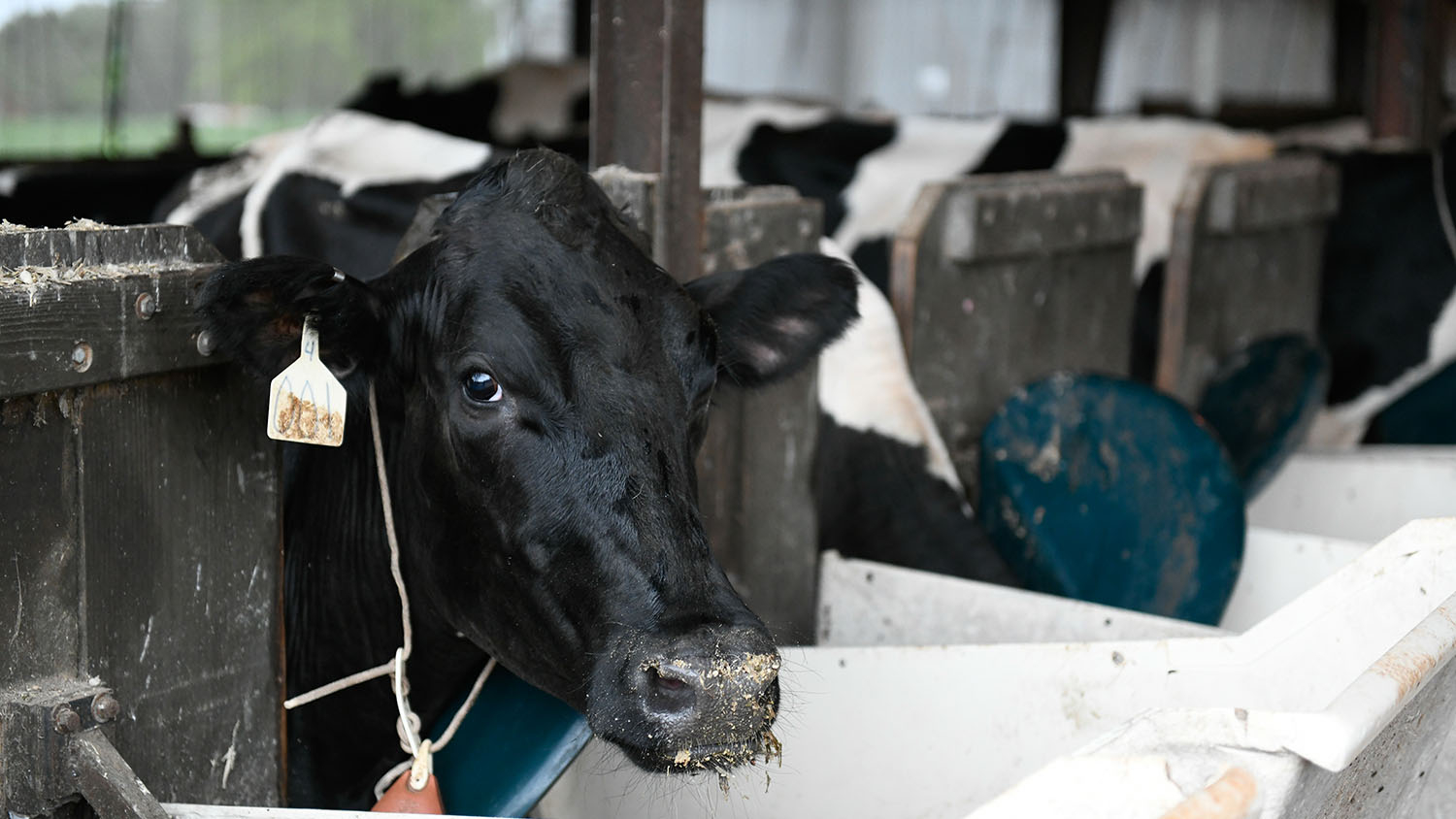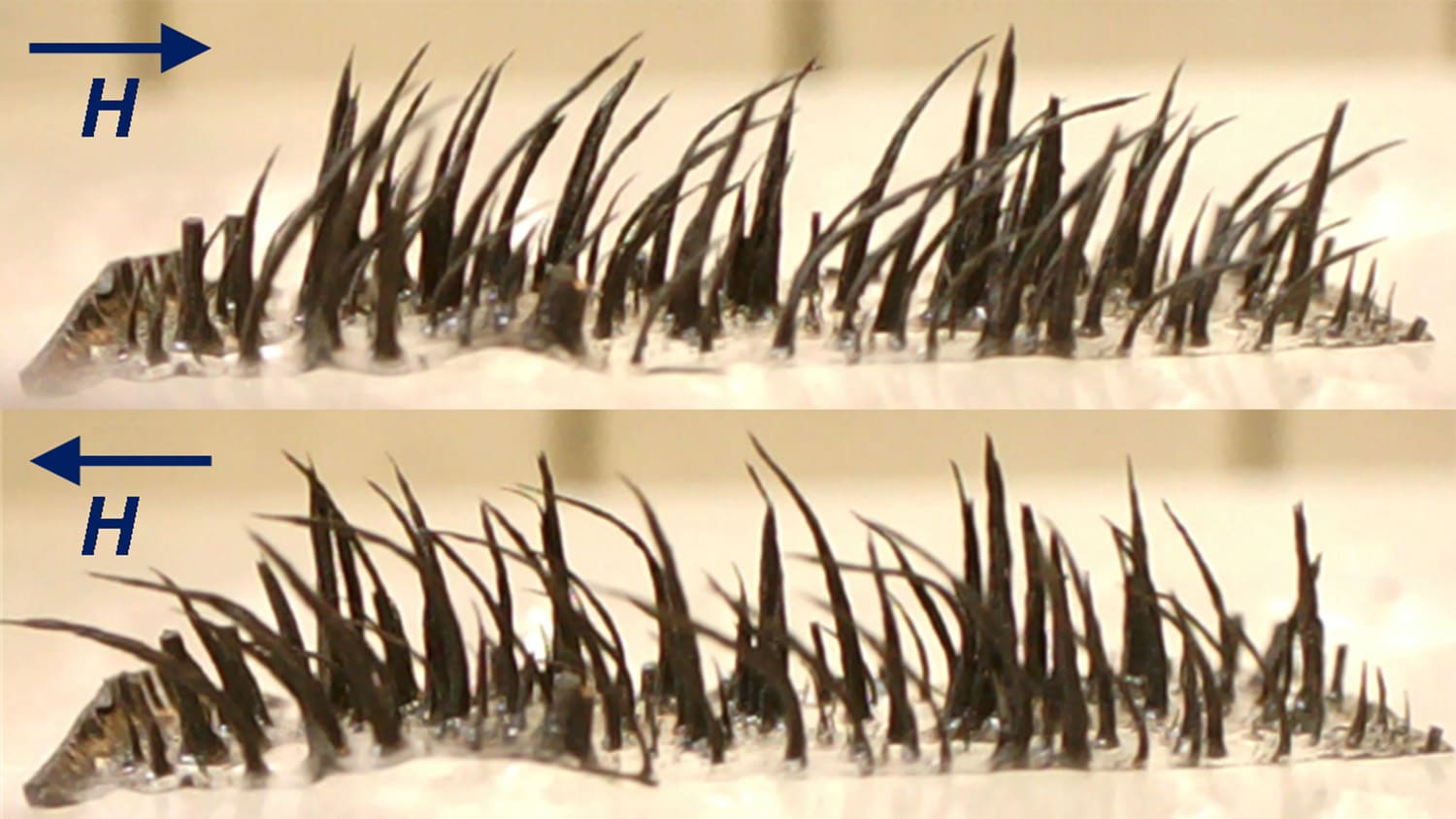Events Preceding the Helvetican Renaissance (Part IV)

Editor’s Note: Readers of The Abstract are generally interested in research, science and technology. People that fall into that camp are often also devotees of science fiction. So, in a throw back to the serialized storytelling of the golden age of sci-fi, we decided to serialize some science fiction by one of our favorite authors – John Kessel. Kessel is a two-time Nebula award winner and a professor of English at NC State. New installments will come out every week for five weeks. The first installment can be found here. “Events Preceding the Helvetican Renaissance” is copyright 2009 by John Kessel. Enjoy!
The door closed behind us with a disturbing finality, wrapping us in the silence of a tomb. We found ourselves in a corridor at least twice our height and three times that in width. Our lights showed walls smooth as plaster, but when I laid my hand on one, it proved to be cut from the living rock. Our boots echoed on the polished but dusty floor. The air was stale, unbreathed by human beings for unnumbered years.
I made Nahid sit. “Rest,” I said. “Let me look at that leg.”
Though she complied, she kept her blaster out, and her eyes scanned our surroundings warily. “Did you know of this?”
“No. The gods told me, just as we were caught in the pass.”
“Praise be to the Pujmanian Order.” I could not tell if there was any sarcasm in her voice.
A trickle of blood ran down her boot from the wound of a projectile gun. I opened the seam of her suit, cleaned the wound with antiseptic from my suit’s first aid kit, and bandaged her leg. “Can you walk?” I asked.
She gave me a tight smile. “Lead on, Brother Adlan.”
We moved along the hall. Several smaller corridors branched off, but we kept to the main way. Periodically, we came across doors, most of them closed. One gaped open upon a room where my light fell on a garage of wheeled vehicles, sitting patiently in long rows, their windows thick with dust. In the corner of the room, a fracture in the ceiling had let in a steady drip of water that had corroded the vehicle beneath it into a mass of rust.
Along the main corridor our lights revealed hieroglyphics carved above doorways, dead oval spaces on the wall that might once have been screens or windows. We must have gone a kilometer or more when the corridor ended suddenly in a vast cavernous opening.
Our lights were lost in the gloom above. A ramp led down to an underground city. Buildings of gracious curves, apartments like heaps of grapes stacked upon a table, halls whose walls were so configured that they resembled a huge garment discarded in a bedroom. We descended into the streets.
The walls of the buildings were figured in abstract designs of immense intricacy, fractal patterns from immense to microscopic, picked out by the beams of our flashlights. Colored tiles, bits of glass and mica. Many of the buildings were no more than sets of walls demarcating space, with horizontal trellises that must once have held plants above them rather than roofs. Here and there, outside what might have been cafes, tables and benches rose out of the polished floor. We arrived in a broad square with low buildings around it, centered on a dry fountain. The immense figures of a man, a woman, and a child dominated the center of the dusty reservoir. Their eyes were made of crystal, and stared blindly across their abandoned city.
Weary beyond words, hungry, bruised, we settled against the rim of the fountain and made to sleep. The drawn skin about her eyes told me of Nahid’s pain. I tried to comfort her, made her rest her legs, elevated, on my own. We slept.
When I woke, Nahid was already up, changing the dressing on her bloody leg. The ceiling of the cave had lit, and a pale light shone down, making an early arctic dawn over the dead city.
“How is your leg?” I asked.
“Better. Do you have any more anodynes?”
I gave her what I had. She took them, and sighed. After a while, she asked, “Where did the people go?”
“They left the universe. They grew beyond the need of matter, and space. They became gods. You know the story.”
“The ones who made this place were people like you and me.”
“You and I are the descendants of the re-creation of a second human race three million years after the first ended in apotheosis. Or of the ones left behind, or banished back into the material world by the gods for some great crime.”
Nahid rubbed her boot above the bandaged leg. “Which is it? Which child’s tale do you expect me to believe?”
“How do you think I found the place? The gods told me, and here it is. Our mission is important to them, and they are seeing that we succeed. Justice is to be done.”
“Justice? Tell the starving child about justice. The misborn and the dying. I would rather be the random creation of colliding atoms than subject to the whim of some transhumans no more godlike than I am.”
“You speak out of bitterness.”
“If they are gods, they are responsible for the horror that occurs in the world. So they are evil. Why otherwise would they allow things to be as they are?”
“To say that is to speak out of the limitations of our vision. We can’t see the outcome of events. We’re too close. But the gods see how all things will eventuate. Time is a landscape to them. All at once they see the acorn, the seedling, the ancient oak, the woodsman who cuts it, the fire that burns the wood, and the smoke that rises from the fire. And so they led us to this place.”
“Did they lead the bullet to find my leg? Did they lead your order to place me on a shelf for a lifetime, separate me from every person I loved?” Nahid’s voice rose. “Please save me your theodical prattle!”
“‘Theodical.’ Impressive vocabulary for a soldier. But you—”
A scraping noise came from behind us. I turned to find that the giant male figure in the center of the fountain had moved. As I watched, its hand jerked another few centimeters. Its foot pulled free of its setting, and it stepped down form the pedestal into the empty basin.
We fell back from the fountain. The statue’s eyes glowed a dull orange. Its lips moved, and it spoke in a voice like the scraping together of two files: “Do not flee, little ones.”
Nahid let fly a shot from her blaster, which ricocheted off the shoulder of the metal man and scarred the ceiling of the cave. I pulled her away and we crouched behind a table before an open-sided building at the edge of the square.
The statue raised its arms in appeal. “Your shoes are untied,” it said in its ghostly rasp. “We know why you are here. It seems to you that your lives hang in the balance, and of course you value your lives. As you should, dear ones. But I, who have no soul and therefore no ability to care, can tell you that the appetites that move you are entirely transitory. The world you live in is a game. You do not have a ticket.”
“Quite mad,” Nahid said. “Our shoes have no laces.”
“But it’s also true—they are therefore untied,” I said. “And we have no tickets.” I called out to the metal man, “Are you a god?”
“I am no god,” the metal man said. “The gods left behind the better part of themselves when they abandoned matter. The flyer lies on its side in the woods. Press the silver pentagon. You must eat, but you must not eat too much. Here is food.”
The shop behind us lit up, and in a moment the smell of food wafted from within.
I slid over to the entrance. On a table inside, under warm light, were two plates of rice and vegetables.
“He’s right,” I told Nahid.
“I’m not going to eat that food. Where did it come from? It’s been thousands of years without a human being here.”
“Come,” I said. I drew her inside and made her join me at the table. I tasted. The food was good. Nahid sat warily, facing out to the square, blaster a centimeter from her plate. The metal man sat on the plaza stones, cross-legged, ducking its massive head in order to watch us. After a few moments, it began to croon.
Its voice was a completely mechanical sound, but the tune it sang was sweet, like a peasant song. I cannot convey to you the strangeness of sitting in that ancient restaurant, eating food conjured fresh out of nothing by ancient machines, listening to the music of creatures who might have been a different species from us.
When its song was ended, the metal man spoke: “If you wish to know someone, you need only observe that on which he bestows his care, and what sides of his own nature he cultivates.” It lifted its arm and pointed at Nahid. Its finger stretched almost to the door. I could see the patina of corrosion on that metal digit. “If left to the gods, you will soon die.”
The arm moved, and it pointed at me. “You must live, but you must not live too much. Take this.”
The metal man opened the curled fingers of its hand, and in its huge palm was a small, round metallic device the size of an apple. I took it. Black and dense, it filled my hand completely. “Thank you,” I said.
The man stood and returned to the empty fountain, climbed onto the central pedestal, and resumed its position. There it froze. Had we not been witness to it, I could never have believed it had moved.
Nahid came out of her musing over the man’s sentence of her death. She lifted her head. “What is that thing?”
I examined the sphere, surface covered in pentagonal facets of dull metal. “I don’t know.”
In one of the buildings, we found some old furniture, cushions of metallic fabric that we piled together as bedding. We huddled together and slept.
#
Selene: Hear that vessel that docks above?/ It marks the end of our lives/ And the beginning of our torment.
Stochik: Death comes/ And then it’s gone. Who knows/ What lies beyond that event horizon?/ Our life is but a trifle,/ A child’s toy abandoned by the road/ When we are called home.
Selene: Home? You might well hope it so,/ But—
[Alarums off stage. Enter a god]
God: The hull is breached!/ You must fly.
In the night I woke, chasing away the wisps of a dream. The building we were in had no ceiling, and faint light from the cavern roof filtered down upon us. In our sleep, we had moved closer together, and Nahid’s arm lay over my chest, her head next to mine, her breath brushing my cheek. I turned my face to her, centimeters away. Her face was placid, her eyelashes dark and long.
As I watched her, her eyelids fluttered and she awoke. She did not flinch at my closeness, but simply, soberly looked into my own eyes for what seemed like a very long time. I leaned forward and kissed her.
She did not pull away, but kissed me back strongly. She made a little moan in her throat, and I pulled her tightly to me.
We made love in the empty, ancient city. Her fingers entwined with mine, arms taut. Shadow of my torso across her breast. Hard, shuddering breath. Her lips on my chest. Smell of her sweat and mine. My palm brushing her abdomen. The feeling of her dark skin against mine. Her quiet laugh.
“Your leg,” I said, as we lay in the darkness, spent.
“What about it?”
“Did I hurt you?”
She laughed again, lightly. “Now you ask. You are indeed all man.”
In the morning, we took another meal from the ancient restaurant, food that had been manufactured from raw molecules while we waited, or perhaps stored somewhere for millennia.
We left by the corridor opposite the one by which we had entered, heading for the other side of the mountain range. Nahid limped but made no complaint. The passage ended in another door, beyond which a cave twisted upward. In one place, the ceiling of the cave had collapsed, and we had to crawl on our bellies over rubble through the narrow gap it had left. The exit was onto a horizontal shelf overgrown with trees, well below the pass. It was mid-morning. A misting rain fell across the Sharishabz Valley. In the distance, hazed by clouds of mist, I caught a small gleam of the white buildings of the monastery on the Penitent’s Ridge. I pointed it out to Nahid. We scanned the mountainside below us, searching for the forest road.
Nahid found the thread of the road before I. “No sign of the Caslonians,” she said.
“They’re guarding the pass on the other side of the mountain, searching the woods there for us.”
We descended the slope, picking our way through the trees toward the road. The mist left drops of water on our skinsuits, but did not in any way slow us. My spirits rose. I could see the end of this adventure in sight, and wondered what would happen to Nahid then.
“What will you do when we get to the monastery?” I asked her.
“I think I’ll leave as soon as I can. I don’t want to be there when the Caslonians find out you’ve reached your order with the plays.”
“They won’t do anything. The gods hold the monastery in their hands.”
“Let us hope they don’t drop it.”
She would die soon, the statue had said—if left to the gods. But what person was not at the mercy of the gods? Still, she would be much more at risk alone, away from the order. “What about your leg?” I asked.
“Do you have a clinic there?”
“Yes.”
“I’ll take an exoskeleton and some painkillers and be on my way.”
“Where will you go?”
“Wherever I can.”
“But you don’t even know what’s happened in the last sixty years. What can you do?”
“Maybe my people are still alive. That’s where I’ll go—the town where I grew up. Perhaps I’ll find someone who remembers me. Maybe I’ll find my own grave.”
“Don’t go.”
She strode along more aggressively. I could see her wince with each step. “Look, I don’t care about your monastery. I don’t care about these plays. Mostly, I don’t care about you. Give me some painkillers and an exo, and I’ll be gone.”
That ended our conversation. We walked on in silence through the woods, me brooding, she limping along, grimacing.
We found the forest road. Here the land fell away sharply, and the road, hardly more than a gravel track, switchbacked severely as we made our way down the mountainside. We met no signs of pursuit. Though the rain continued, the air warmed as we moved lower, and beads of sweat trickled down my back under the skinsuit. The boots I wore were not meant for hiking, and by now my feet were sore, my back hurt. I could only imagine how bad it was for Nahid.
I had worked for years to manage my appetites, and yet I could not escape images of our night together. With a combination of shame and desire, I wanted her still. I did not think I could go back to being just another monk. The order had existed long before the Caslonian conquest, and would long outlast it. I was merely a cell passing through the body of this immortal creation. What did the gods want from me? What was to come of all this?
At the base of the trail, the road straightened, following the course of the River Sharishabz up the valley. Ahead rose the plateau, the gleaming white buildings of the monastery clearly visible now. The ornamental gardens, the terraced fields tended by the order for millennia. I could almost taste the sweet oranges and pomegranates. It would be good to be back home, a place where I could hide away form the world and figure out exactly what was in store for me. I wouldn’t mind being hailed as a hero, the liberator of our people, like Stochik himself, who took the plays from the hands of the gods.
The valley sycamores and aspens rustled with the breeze. The afternoon passed. We stopped by the stream and drank. Rested, then continued.
We came to a rise in the road, where it twisted to climb the plateau. Signs here of travel, ruts of iron wheels where people from the villages drove supplies to the monastery. Pilgrims passed this way—though there was no sign of anyone today.
We made a turn in the road, and I heard a yelp behind me. I turned to find Nahid struggling in the middle of the road. At first, I thought she was suffering a seizure. Her body writhed and jerked. Then I realized, from the slick of rain deflected from his form, that she was being assaulted by a person in an invisibility cloak.
This understanding had only flashed through my mind when I was thrown to the ground by an unseen hand. I kicked out wildly, and my boot made contact. Gravel sprayed beside me where my attacker fell. I slipped into accelerated mode, kicked him again, rolled away, and dashed into the woods. Above me I heard the whine of an approaching flyer. Run! It was the voice of Horus, god of sun and moon.
I ran. The commandos did not know these woods the way I did. I had spent ten years exploring them, playing games of hide and hunt in the night with my fellow novices: I knew I could find my way to the monastery without them capturing me.
And Nahid? Clearly this was her spoken-of death. No doubt it had already taken place. Or perhaps they wouldn’t kill her immediately, but would torture her, assuming she knew something, or even if they knew she didn’t, taking some measure of revenge on her body. It was the lot of a Republican Guard to receive such treatment. She would even expect it. The order comes first.
Every second took me farther from the road, away from the Caslonians. But after a minute of hurrying silently through the trees, I felt something heavy in my hand. I stopped. Without realizing it, I had taken the object the metal man had given me out of my belt pouch. She would not want you to return. The freedom of her people comes before her personal safety.
I circled back, and found them in the road.
The flyer had come down athwart the road. The soldiers had turned off their cloaks, three men garbed head to toe in the matte gray of light deflection suits. Two soldiers had Nahid on her knees in the drizzle, her hands tied behind her back. One jerked her head back by her hair, holding a knife to her throat while an officer asked her questions. The officer slapped her, whipping the back of his gloved hand across her face.
I moved past them through the woods, sound of rain on the foliage, still holding the metal sphere in my hand. The flyer sat only a few meters into the road. I crouched there, staring at the uncouth object. I rotated it in my palm until I found the surface pentagon that was silvered. I depressed this pentagon until it clicked.
Then I flipped it out into the road, under the landing pads of the flyer, and fell back.
It was not so much an explosion as a vortex, warping the flyer into an impossible shape, throwing it off they road. As it spun the pilot was tossed from the cockpit, his uniform flaring in electric blue flame. The three men with Nahid were sucked off their feet by the dimensional warp. They jerked their heads toward the screaming pilot. The officer staggered to his feet, took two steps toward him, and one of the men followed. By that time, I had launched myself into the road, and slammed my bad shoulder into the small of the back of the man holding Nahid. I seized his rifle and fired, killing the officer and the other soldier, then the one I had just laid flat. The pilot was rolling in the gravel to extinguish the flames. I stepped forward calmly and shot him in the head.
Acrid black smoke rose from the crushed flyer, which lay on its side in the woods.
Nahid was bleeding from a cut on her neck. She held her palm against the wound, but the blood seeped steadily from between her fingers. I gathered her up and dragged her into the woods before reinforcements could arrive.
“Thank you,” Nahid gasped, her eyes large, and fixed on me. We limped off into the trees.
- Categories:


